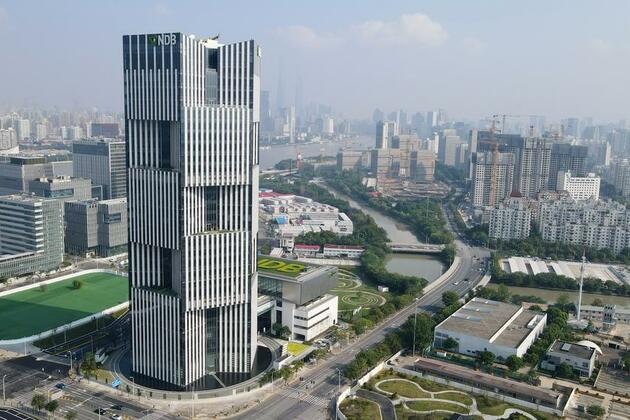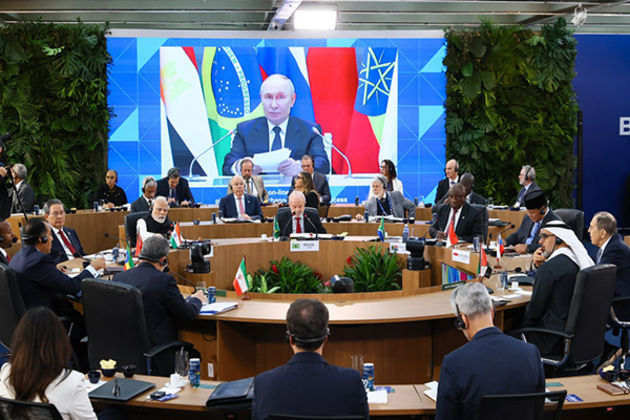Huawei's David Wang: UBB5.5G Maximizes Digital Productivity
PR Newswire
12 Oct 2023, 23:28 GMT+10

DUBAI, UAE, Oct. 13, 2023 /PRNewswire/ -- At the 9th Ultra-Broadband Forum (UBBF 2023), David Wang, Huawei's Executive Director of the Board and Chairman of the ICT Infrastructure Managing Board, delivered a keynote titled "UBB5.5G Maximizes Digital Productivity" on the ultra-broadband industry's latest developments and best practices. During this keynote, he shared his viewpoints on the strategic direction that ultra-broadband (UBB) is currently moving in - upgrading networks, accelerating the widespread application of digital technologies, and maximizing digital productivity.
Deeper application of digital technologies in the real economy is driving increases in productivity. This so-called digital productivity is rapidly becoming a core engine of growth for the digital economy. Digital technologies, such as cloud, AI, 5G, and UBB, are also constantly evolving. They are now being seen in enterprises and homes through new digital services. This has made digital transformation faster for enterprises and is bringing better intelligent entertainment, life, and work to the masses. The adoption of these new services is also compounding advances in digital productivity.
Wang said, "Originally, ultra-broadband networks were focused on delivering connectivity. Then we shifted gears to pursue better experience. In the 5.5G era, ultra-broadband will focus on further unleashing productivity of digital services, so that everyone can access digital services more easily and efficiently, regardless of where they are. Such next-generation digital infrastructure will provide ubiquitous 10-gigabit access, elastic ultra-broadband transport, and massive computing power supported by hyper-converged data centers. The rollout of this new generation of digital infrastructure will also enable faster development of the digital economy. Huawei will join hands with customers and industry partners to drive F5.5G and Net5.5G evolution as well as the entire ultra-broadband industry forward to maximize digital productivity."
Maximizing digital productivity, Wang explained, will require overcoming three critical challenges. First, the industry will need to figure out how to support the massive computing power needed to provide digital services. Second, it will need to provide guaranteed connectivity services for massive numbers of concurrent users. Third, it will need to ensure ubiquitous access and high-quality experience for anyone, no matter where they are.
He went on to explain the upgrades productivity-centric ultra-broadband networks will require in the future.
First, ubiquitous 10-gigabit access could be achieved by accelerating mobile broadband, home broadband, enterprise campus network, and enterprise private line service upgrade to 10 Gbps. This would enable ubiquitous 10-gigabit mobile broadband, provide whole-house seamless 10-gigabit home networks, upgrade 10-gigabit campus connectivity for organizations, and deliver elastic, high-throughput, 10-gigabit private line services. Thanks to these high-quality, 10-gigabit connections, digital services will benefit more people and organizations around the world.
Ubiquitous 10-gigabit access would also need converged bearer networks to evolve into high-quality, elastic transport networks. Most IP and optical metro networks would need to support 400G and further evolve to 800G. Backbone networks would also support 400G, with stronger transport capabilities. End-to-end optical cross-connect (OXC) networks will provide experience assurance for latency-sensitive services. Currently, the acceptable latency for access, metro, and national network services is 1 millisecond, 5 milliseconds, and 20 milliseconds, respectively.
In addition, hyper-converged data centers will be needed to fully unleash AI computing power. By adopting an advanced hyper-converged architecture, Wang said, data center networks would be able to address general-purpose computing, storage, high-performance computing, and AI computing requirements. When coupled with 800GE high-speed interconnection, this will significantly increase return on investment. With explicit congestion notification algorithms and network scale load balancing algorithms, lossless networks with 85% higher IOPS and AI cluster networks that increase training efficiency by 20% are possible.
Last but not least, telecom large models would be needed to make networks more autonomous and give them self-optimization capabilities. Current networks with high levels of automation and digitalization are expected to soon incorporate new intelligent functions that will make them more autonomous. Telecom large models can accelerate this process to develop L4 autonomous driving networks (ADNs) that are intent-driven and support human-computer interaction and self-optimization. These models are already allowing engineers to manage twice as many equipment sets as they could before.
Wang stressed that ultra-broadband is critical infrastructure that will turbocharge digital economic growth. He called on different ecosystem players to work together to provide policy support and accelerate business innovation, product application, and ecosystem development. By working together, Wang concluded, the ultra-broadband industry will continue to race forward, maximizing digital productivity so that more people and organizations will benefit from digital services.
 Share
Share
 Tweet
Tweet
 Share
Share
 Flip
Flip
 Email
Email
Watch latest videos
Subscribe and Follow
Get a daily dose of Malaysia Sun news through our daily email, its complimentary and keeps you fully up to date with world and business news as well.
News RELEASES
Publish news of your business, community or sports group, personnel appointments, major event and more by submitting a news release to Malaysia Sun.
More InformationSoutheast Asia
SectionTrump signals progress on India Trade, criticizes Japan stance
WASHINGTON, D.C.: President Donald Trump says the United States could soon reach a trade deal with India. He believes this deal would...
UN Demands End to Myanmar Violence as Junta’s Election Plans Risk Further Instability
Nearly three months after a devastating earthquake struck Myanmar, the country remains trapped in a deepening crisis, compounded by...
Daily World Briefing, July 7
China ready to promote flagship Belt and Road project, boost trade, investment with Ethiopia -- Premier Li China stands ready to...
Jaishankar, Russian counterpart Lavrov discuss bilateral cooperation, West Asia
Rio de Janeiro [Brazil], July 7 (ANI): External Affairs Minister S Jaishankar held a meeting with his Russian counterpart Sergey Lavrov...
BRICS welcomes Indonesia as member, and 10 partner countries, including Belarus, Malaysia
Rio de Janeiro [Brazil], July 7 (ANI): Leaders of the BRICS nations welcomed Indonesia as a member of the group, while 10 nations,...
"Perception of technique, people changes after every match, series...": Gill following historic Birmingham masterclass
Birmingham [UK], July 7 (ANI): Following a historic outing with the bat at Birmingham, Indian skipper Shubman Gill reflected on changes...
Business
SectionRussia among 4 systemic risk countries for Italian banks
MILAN, Italy: Italian regulators have flagged four non-EU countries—including Russia—as carrying systemic financial risk for domestic...
US debt limit raised, but spending bill fuels fiscal concerns
NEW YORK CITY, New York: With just weeks to spare before a potential government default, U.S. lawmakers passed a sweeping tax and spending...
Shein hit with 40 million euro fine in France over deceptive discounts
PARIS, France: Fast-fashion giant Shein has been fined 40 million euros by France's antitrust authority over deceptive discount practices...
Meta hires SSI CEO Gross as AI race intensifies among tech giants
PALO ALTO/TEL AVIV: The battle for top AI talent has claimed another high-profile casualty—this time at Safe Superintelligence (SSI),...
Engine defect prompts Nissan to recall over 443,000 vehicles
FRANKLIN, Tennessee: Hundreds of thousands of Nissan and Infiniti vehicles are being recalled across the United States due to a potential...
Microsoft trims jobs to manage soaring AI infrastructure costs
REDMOND, Washington: Microsoft is the latest tech giant to announce significant job cuts, as the financial strain of building next-generation...














